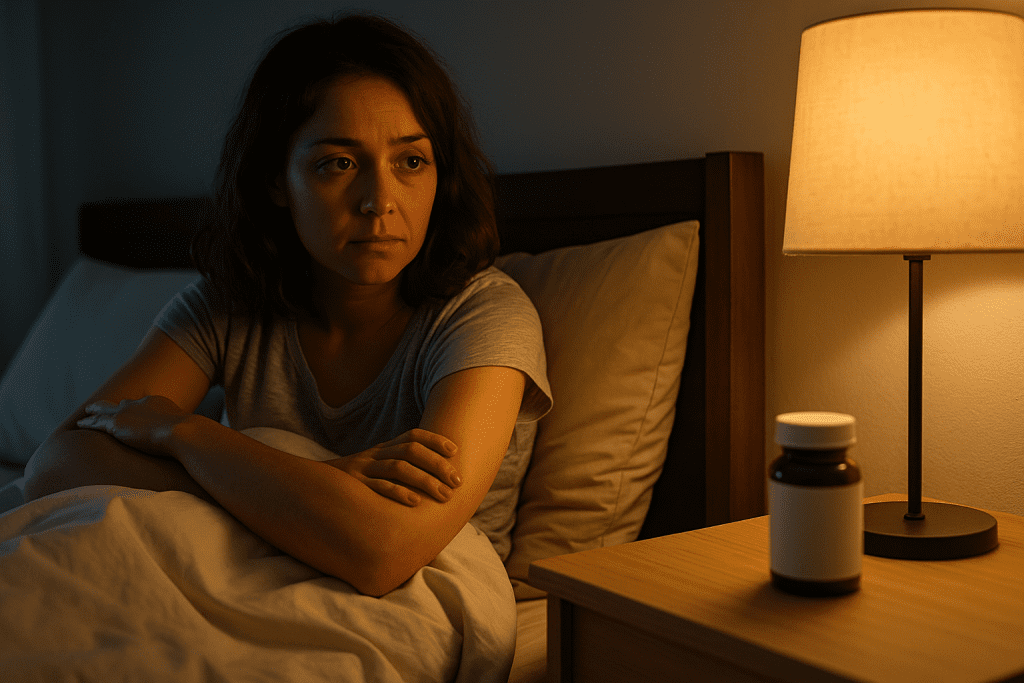If you’re struggling with insomnia while using a herbal antidepressant or an SSRI, you’re not alone. Many people combine natural remedies like St. John’s Wort with prescription medications in hopes of faster results—only to find their sleep disrupted.
This article explores how st john’s wort SSRI insomnia develops, why the combination can be dangerous, and which timing or treatment alternatives might help.
Quick Answer: Why St. John’s Wort and SSRIs Can Worsen Sleep
| Question | Answer |
|---|---|
| Can you mix St. John’s Wort with SSRIs? | No. Combining them increases the risk of serotonin syndrome and insomnia. |
| What causes sleep issues? | Both overstimulate serotonin, disrupting sleep architecture. |
| How to avoid insomnia from herbal antidepressants? | Dose in the morning and avoid combining with SSRIs. |
| Safer alternatives? | Try mirtazapine, low-dose trazodone, or non-drug sleep strategies. |
How St. John’s Wort Affects Serotonin and Sleep

Hyperforin’s Role in Serotonin Overload
St. John’s Wort (Hypericum perforatum) is often marketed as a natural antidepressant, but its mechanism is far from gentle. Its active compound, hyperforin, acts as a reuptake inhibitor for serotonin, dopamine, norepinephrine, GABA, and glutamate, similarly to how SSRIs work (PubChem).
When St. John’s Wort and SSRIs are taken together, their overlapping serotonin-boosting actions can lead to:
- Difficulty falling or staying asleep
- Restlessness or agitation
- Increased risk of serotonin syndrome
Hyperforin’s effect can persist due to its long half-life and interaction with liver enzymes, which alters how other drugs are processed (JAMA).
The Risk of Serotonin Syndrome
This rare but dangerous condition occurs when there’s too much serotonin in the brain. Symptoms may include:
- Tremor, confusion, sweating, and high body temperature
- Agitation and difficulty sleeping
- In extreme cases, seizures or fatal outcomes
According to the AAFP and Medsafe, combining herbal supplements like St. John’s Wort with SSRIs significantly increases this risk (AAFP, Medsafe).
Does Either Cause Insomnia Alone?
Even on their own, both St. John’s Wort and SSRIs can affect sleep quality.
St. John’s Wort and Sleeplessness
Although often used to treat mild depression and anxiety, this herbal remedy isn’t sleep-neutral. According to the Mayo Clinic and Drugs.com, side effects can include:
- Insomnia or vivid dreams
- Tiredness or restlessness
- Difficulty with nighttime dosing
One user on Drugs.com shared:
“Taking it at night makes it difficult to sleep, so I take a smaller dose in the evening than in the morning.”
SSRIs and Their Sleep Disruption
Selective serotonin reuptake inhibitors like sertraline or fluoxetine are well-known for causing:
- Initial sleeplessness, especially in the first few weeks
- Changes in REM cycles
- Vivid or unsettling dreams
While some studies show SSRIs can improve depression-related sleep issues over time (AAFP), others highlight increased sleep latency and fragmentation during the adjustment phase.
Related: Melatonin interaction with SSRIs and SNRIs
Safer Strategies to Manage Sleep While on Antidepressants

If you’re taking either a herbal antidepressant or an SSRI (but not both), these adjustments may reduce sleeplessness:
1. Time Your Dose Earlier in the Day
Both types of antidepressants can be stimulating, especially when levels peak in the bloodstream. Experts from Mayo Clinic and RxList recommend:
- Take St. John’s Wort in the morning, not before bed
- SSRIs are best taken early in the day unless otherwise directed by your doctor
2. Reduce or Split Doses
Some users find smaller, spaced-out doses more tolerable. For example:
“Reducing the evening dose helped my sleep without affecting my mood,” noted one user on Drugs.com.
Always check with your provider before modifying dosage.
3. Practice Non-Drug Sleep Hygiene
Simple daily habits can improve sleep without medications:
- Avoid caffeine or heavy meals late in the day
- Keep consistent bed and wake times
- Get 20–30 minutes of sunlight and movement daily
If you’re combining supplements, also be mindful of antidepressants and 5-HTP serotonin syndrome risk.
What Are Better Alternatives for Sleep and Depression?
When sleep troubles and mood concerns collide, these options may offer better support:
1. Mirtazapine
Unlike SSRIs, mirtazapine is sedating and can help restore sleep architecture. Studies show it:
- Promotes longer deep sleep stages
- Reduces time to fall asleep
- Is effective even at low doses (PubMed)
2. Low-Dose Trazodone or Doxepin
Though not first-line antidepressants, these medications have off-label benefits for sleep:
- Fewer risks of serotonin syndrome when used alone
- Generally well-tolerated at low doses
- Often prescribed in cases where SSRIs trigger insomnia (Cochrane)
3. Cognitive Behavioral Therapy for Insomnia (CBT-I)
This non-drug approach has been proven effective long-term. CBT-I helps:
- Rewire unhelpful sleep patterns
- Address negative thoughts about sleep
- Improve sleep without side effects
Final Thoughts
Combining St. John’s Wort with SSRIs is not only risky but often counterproductive when it comes to sleep. The interaction can amplify serotonergic effects, increase your risk of serotonin syndrome, and worsen sleeplessness. If you’re using either treatment for depression, choose morning dosing, consider alternatives like mirtazapine, and always discuss plans with your provider.
For more support with supplements and sleep, explore:



Pingback: Pregnancy Supplements and Antidepressants [Expert Guide] | Useful Vitamins